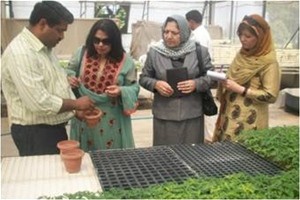
Afghan Women’s Business Council managers Mahooba Waizi and Khubera Zaifi are shown modern vegetable propagation methods at the Indian Agricultural Research Institute.
USAID
Afghanistan’s businesswomen learn the tricks of the export trade from their Indian counterparts
4 JUNE 2011
Fresh from an eight-day training on entrepreneurship development in India, Mahooba Waizi and Khubera Zaifi of the Afghan Women’s Business Council (AWBC) are applying their knowledge to strengthen the role of Afghan women in the country’s agribusiness sector. As partners of USAID in a gender-focused, agribusiness entrepreneurship program, the practical training helped the women leaders shape their plan to expand market share and break into international markets.
Waizi, the chief executive officer of AWBC, has already invited different women-led businesses operating in Kabul and Parwan provinces to be a part of a women’s business consortium that will export fresh produce and processed products.
“In order to be able to export, I need to have a good pool of suppliers,” Waizi said. “Together, we can begin to fill the orders of foreign companies that have shown strong interest in buying Afghan produce.”
According to Waizi, the training in India was timely because she is faced with the task of organizing resources to be able to export. Waizi made several important business connections during her participation in Gulfood in Dubai in February 2011. USAID facilitated her participation in the Middle East’s largest event for the food industry and Waizi said she is receiving many inquiries regarding Afghan produce. The recent training gave the Afghan businesswomen insight on how successful women-owned businesses operate in India.
During their training in India, the Afghan women interviewed women managers and workers, inspected factory equipment and machinery for production and packaging, and looked at different ways to package products for export. The educational trip covered various sectors including textiles, agriculture, food-processing, handicrafts, and information technology.
“We came back to Afghanistan full of ideas on how to improve production, packaging, and marketing. The training made us realize that we need to band together and pool our resources so that we can easily respond to export orders,” said Waizi.







Comment
Make a general inquiry or suggest an improvement.